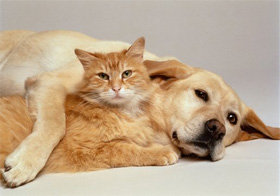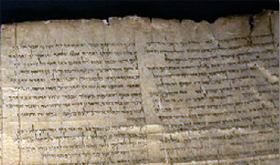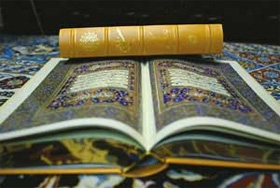Allah is never unjust
Allah (swt) is The Most Knowing (Al ‘Aleem), the All-Wise (Al Hakeem), The Purifier (Al Qudoos),and He instructs all that is good and pure for both men and women in this life and the next.
Allah (swt) is never unjust, not even in the slightest. He ordered both men and women to take some measures that will lead them to live an honorable, dignified life.
Why dress code?
If you are thinking: “but why is He ordering certain clothing in the first place?”, then let me share with you some excerpts from a university’s dress code guidelines that staff, employees and students are obliged to adhere to. Mind you, this is an American University:
“This policy sets guidance [for what’s expected from staff and employees].
Failure to comply with guidelines will result in disciplinary actions.
Clothing should be appropriate and not display profanity.
Shorts are not appropriate and cannot be worn.
Attires should not distract or disrupt work environment.”
The guidelines go on to say what exactly is acceptable and what isn’t.
This is not restricted to the university, but also work places/job interviews/sports clubs/ some restaurants. There are laws, regulations and guidelines designed by different authorities to inform people of what’s acceptable and what isn’t.
In the university example we mentioned earlier, they have imposed laws to make sure that no one is dressed in a manner that is distracting, disrupting or disrespectful.
As an authority, the university decided what is best for its community.
Allah know what is best and purest for us
Now, as the Supreme Authority, doesn’t Allah (swt) also know what is best and purest for His created beings?
{Does He who created not know, while He is the Subtle, the Acquainted?} (Quran 67:14)
In His Wisdom, Allah (swt) also informed us of what is best for our communities and our learning journeys on this earth.
In the Chapter called ‘The Light’ in the Noble Quran, Allah says (as translated into English):
(Note: instructions are given to both men and women)
{Tell the believing men to reduce [some] of their vision and guard their private parts. That is purer for them. Indeed, Allah is Acquainted with what they do.And tell the believing women to reduce [some] of their vision and guard their private parts and not expose their adornment except that which [necessarily] appears thereof and to wrap [a portion of] their head-covers over their chests and not expose their adornment except to their husbands, their fathers,
their husbands’ fathers, their sons, their husbands’ sons, their brothers, their brothers’ sons, their sisters’ sons, their women, that which their right hands possess, or those male attendants having no physical desire, or children who are not yet aware of the private aspects of women. And let them not stamp their feet to make known what they conceal of their adornment. And turn to Allah in repentance, all of you, O believers, that you might succeed.} (Quran 24: 30-31).
So, instructions are given to both men and women to lower their gaze and behave modestly.
Both men and women have rights and responsibilities according to their unique natures; their physiological, psychological and biological compositions.
Why Are Women Ordered to Wear Hijab While Men Aren’t?
Now, with regards to your question, what exactly are we suggesting? That men also wear hijab that covers their heads and chests? Are we suggesting that men and women’s chests are the same and/or seen in the same light? Really? So, if men covered their heads and chests, this will make them less fitnah as you mentioned?
Let us be honest.
Women are more desirable and more concerned with adorning themselves and accentuating their beauty. Who are the largest consumers of the beauty industry, men or women? It is largely women.
So, the point for a woman with regards to the hijab is not to give up her beauty, but rather to be in control of it; to force others to listen to her and know her for who she is, not how she looks.
Now, I was just having a conversation with a colleague of mine about the hijab. I asked her the question you asked. Her most sincere, spontaneous, instantaneous answer was rather beautiful. She said:
“It is so simple, look at who is being used the most to sell products in advertisements… is it men or women? It is women, of course. Women are the most beautiful. Allah asked both men and women to lower their gaze and dress modestly. But women are more beautiful. So, when they’re asked to cover a bit more, NOW they can be equal to men, and now both men and women can equally strive to lower their gaze.”
It is a complementary effort that aims to create pure, modest societies.
Allah has elevated women
Women’s full beauty are meant to be enjoyed within the settings mentioned in the verses. Those are basically the settings where the woman is with those who love, cherish and honor her, not objectify or exploit her.
You can do academic research on how women are objectified, exploited and sexualized in advertisements and the media; how the woman’s body is used to sell products and allure audiences for different purposes.
Now, Allah (swt) doesn’t allow for women to be degraded, objectified or descended to that level. Women are much nobler than that. A woman’s body is sacred. Allah has elevated women. Paradise is under the feet of women.
The example of Mariam’s purity and modesty
Allah (swt) dedicated an entire chapter in the Quran for a woman (chapter 19 titled Mary). Why? Because of her purity and modesty… her purity elevated her.
This is Mary (peace be upon her) one of our most noble models to emulate.
{O Mary, indeed Allah has chosen you and purified you and chosen you above the women of the worlds.O Mary, be devoutly obedient to your Lord and prostrate and bow with those who bow [in prayer].} (Quran 3: 42-43)
I remember listening to a lecture about Mary (peace be upon her). The sheikh was mentioning the incident when Angel Jibreel (peace be upon him) was revealed to her. When this happened, Mary (peace be upon her) was a young lady, probably in her teens. Angel Jibreel was revealed to her in the form of a well-proportioned, good looking man.
{And mention, [O Muhammad], in the Book [the story of] Mary, when she withdrew from her family to a place toward the east.And she took, in seclusion from them, a screen. Then We sent to her Our Angel, and he represented himself to her as a well-proportioned man.} (Quran 19: 16-17)
The minute she saw him, she (peace be upon her) said:
{Indeed, I seek refuge in the Most Merciful from you, [so leave me], if you should be fearing of Allah.} (Quran 19: 18)
Unlike some women who complain about ‘fitnah’, she (peace be upon her) knew what to do. She worked on her own modesty and on lowering her own gaze.
When she did that and said what she said, Angel Jibreel (peace be upon him) immediately returned to his angelic form. He returned to being a creation of light.
Her modesty brought out the light in him, the angel in him.
Time for reflection
Now, what do we bring out of those who look at us? The light in them, the remembrance of Allah and the purpose of life… or something else?
What are we, women today, trying to do– seriously and honestly?
Can we look deep down, have a sincere moment with ourselves and think about what are we really after, what desires do we have and what are we trying to achieve?
We, the carriers of life to this earth. We, the creations that are honored and chosen by Allah (swt) to be the carriers of life into existence.
A woman’s womb in Arabic (rahm) is extracted from the name of Allah ArRahman (The Most Merciful). In-and-of itself, this is a sign of elevation and closeness that the woman has with The Creator, The King of kings, and the Giver of Life.
The hadith says: “The word ‘Ar-Rahm‘ (womb) derives its name from ‘Ar- Rahman‘ (i.e. Allah, The Continuously Merciful). So whosoever keeps good relations with it (womb i.e. Kith and kin), Allah will keep good relations with him, and whosoever will sever it (i.e. severs his bonds of Kith and kin) Allah too will sever His relations with him.” [Sahih Al Bukhari]
This is the woman, the source and the foundation of the society, the link that ties the community together.
If her beauty is displayed everywhere, wouldn’t that bring unwanted attention, distraction, envy, jealousy and other aspects that destroy homes, families and relationships… and ruin the foundation of the society that should be strong, pure and united?
It is only befitting for her to be honored and elevated, with clothing revealed from above seven heavens. Is there anything more elevated?
Now let us think: If we are not following Allah (swt), who exactly are we following? Which designer, which brand….? Who is dictating what’s ‘in’ and what isn’t for us, what’s ‘hot and what’s not’? Who is putting pressure on women globally to abide by certain standards of beauty, certain measurements, body types, skin types…. you name it.
The real liberation
If anything, what Allah is calling us for is a sign of His mercy. He is helping us liberate ourselves from having to follow certain standards that change every day. He is making us leaders not followers; independent and dignified. We choose what to cover/uncover, when and to whom.
We’re not meant to be subjugated to whims, desires and trends, or have our bodies; arms, legs, chests revealed and exploited on this magazine or the other.
Why make women easily-accessible objects of desire in such manner when they’re such noble, precious, elevated beings?
Note that veil and modesty have also been prescribed in earlier Scriptures (in Judaism and Christianity).
And the covering that is mentioned in the Quran is in a chapter called “The Light”. In essence, it is a means for women to accentuate the light in their hearts.
Yes, it might be difficult since women love beauty and love beautifying themselves. But, again, we’re not required to give up beauty, but rather discipline when and where it is showcased. It is a means of self-purification and overcoming the nafs and connecting with a higher purpose.
It does bring, for those who are sincere, immense feelings of satisfaction, honor, elevation, spirituality, protection, love, warmth… and other feelings maybe I can’t put them into words.
Men as Fitnah
If men are fitnah, then maybe we should remember and follow Mary (peace be upon her), let us lower our gaze, practice haya’, and help others also work on lowering their gaze… the believing men and the believing women are allies! We’re not competing with one another, fighting or trying to overpower one another.
{The believing men and believing women are allies of one another. They enjoin what is right and forbid what is wrong and establish prayer and give zakah and obey Allah and His Messenger. Those – Allah will have mercy upon them. Indeed, Allah is Exalted in Might and Wise.} (Quran 9:71)
The attitude of “why do I have to do this, not him” or “why do I have to do that, not her” ….This is not mature for us and this is not befitting. There is no room for this between us. We are allies. We are building communities together; pure, dignified communities. We are meant to raise children and serve humanity. Why open doors for distractions, break our homes and create unnecessary fitan for one another.
Men and women complement each other. We don’t need to ask: why are men obligated to spend their money on their families while women aren’t? Or why are women given the ability to give birth and men aren’t? Each of us have rights and responsibilities. Women are the center and the foundation of the family, the community and the Ummah.
Men are maintainers and protectors of women
Men are maintainers and protectors of women. Together they complete and complement each other. While they’re unique in their roles and responsibilities, but in the Sight of Allah, they’re equally valued and rewarded…
{Indeed, the Muslim men and Muslim women, the believing men and believing women, the obedient men and obedient women, the truthful men and truthful women, the patient men and patient women, the humble men and humble women, the charitable men and charitable women, the fasting men and fasting women, the men who guard their private parts and the women who do so, and the men who remember Allah often and the women who do so – for them Allah has prepared forgiveness and a great reward.} (Quran 33: 35)
May Allah make us among them!
May Allah grant us humility and grant us light from His light
May He purify us and help us live a life that is most pleasing to Him, and elevate us to the best of statuses in this life and for eternity. Ameen.
(From Ask About Islam archives)
About Dina Mohamed Basiony


 Islam is a holistic way of life. It takes into account all of humankind’s needs; spiritual, emotional and physical. Part of physical wellbeing includes sexual wellbeing and health. God created sex not only for procreation but to fulfil humankinds need for intimacy. Islam leaves no part of our lives unexplained and thus sexuality and intimacy are not topics that the Quran and the traditions of Prophet Muhammad, may God praise him, shy away from or neglect.
Islam is a holistic way of life. It takes into account all of humankind’s needs; spiritual, emotional and physical. Part of physical wellbeing includes sexual wellbeing and health. God created sex not only for procreation but to fulfil humankinds need for intimacy. Islam leaves no part of our lives unexplained and thus sexuality and intimacy are not topics that the Quran and the traditions of Prophet Muhammad, may God praise him, shy away from or neglect. 
 Islam is a religion devoted to the concept of mercy. Muslims are encouraged to be merciful towards each other, towards all of humankind, towards animals, and even towards the environment. God is the Most Merciful and all mercy originates from Him. When Prophet Muhammad explained the quality of God’s mercy, he used the metaphor of a mother animal showing mercy towards her offspring
Islam is a religion devoted to the concept of mercy. Muslims are encouraged to be merciful towards each other, towards all of humankind, towards animals, and even towards the environment. God is the Most Merciful and all mercy originates from Him. When Prophet Muhammad explained the quality of God’s mercy, he used the metaphor of a mother animal showing mercy towards her offspring


 Many Jews may be surprised to learn that Islam as preached by Muhammad, may the mercy and blessings of God be upon him, was the same religion preached by Abraham, as well as of all other prophets mentioned in the Torah and the Bible. Muslims honor all the prophets of the Jews – Abraham, Jacob, Joseph, Moses, David and Solomon among others – as their own prophets and believe that they all preached on message, that is the belief in the Oneness of God.
Many Jews may be surprised to learn that Islam as preached by Muhammad, may the mercy and blessings of God be upon him, was the same religion preached by Abraham, as well as of all other prophets mentioned in the Torah and the Bible. Muslims honor all the prophets of the Jews – Abraham, Jacob, Joseph, Moses, David and Solomon among others – as their own prophets and believe that they all preached on message, that is the belief in the Oneness of God. 